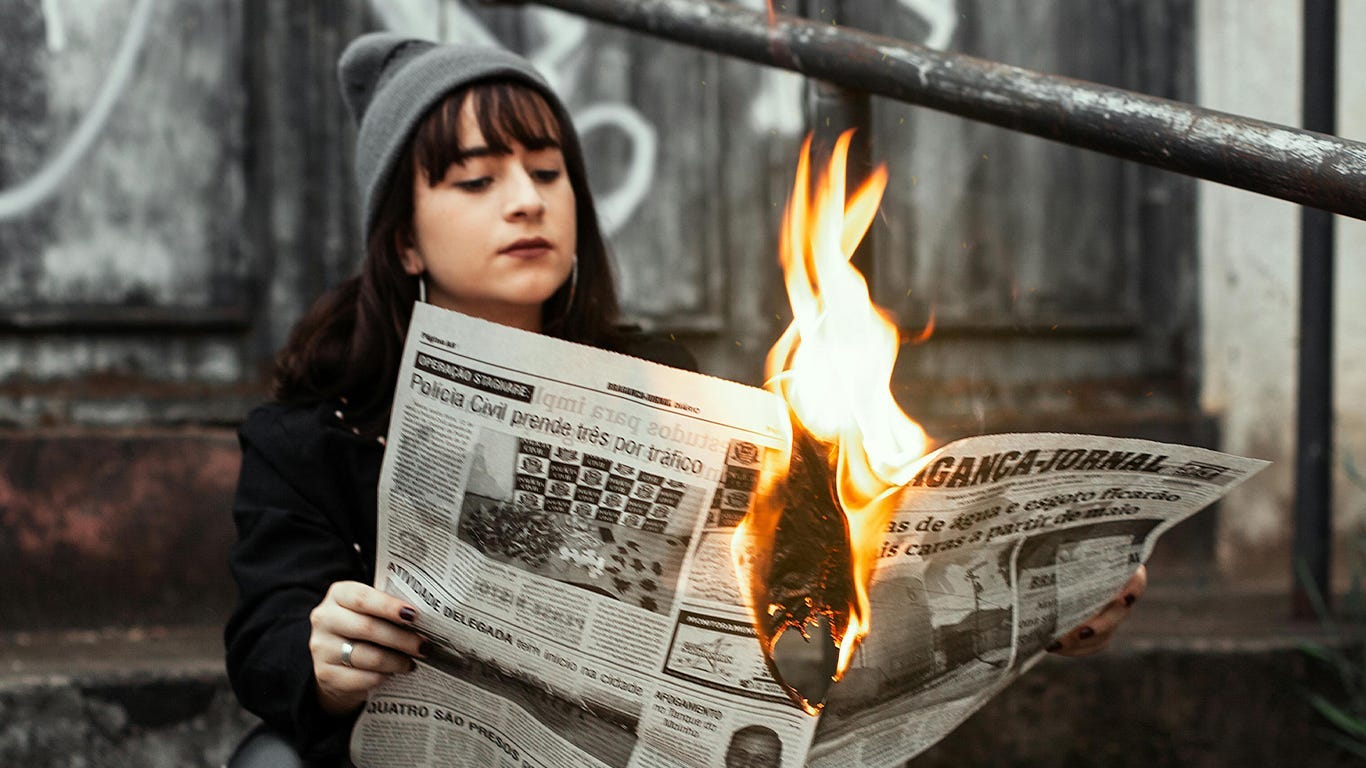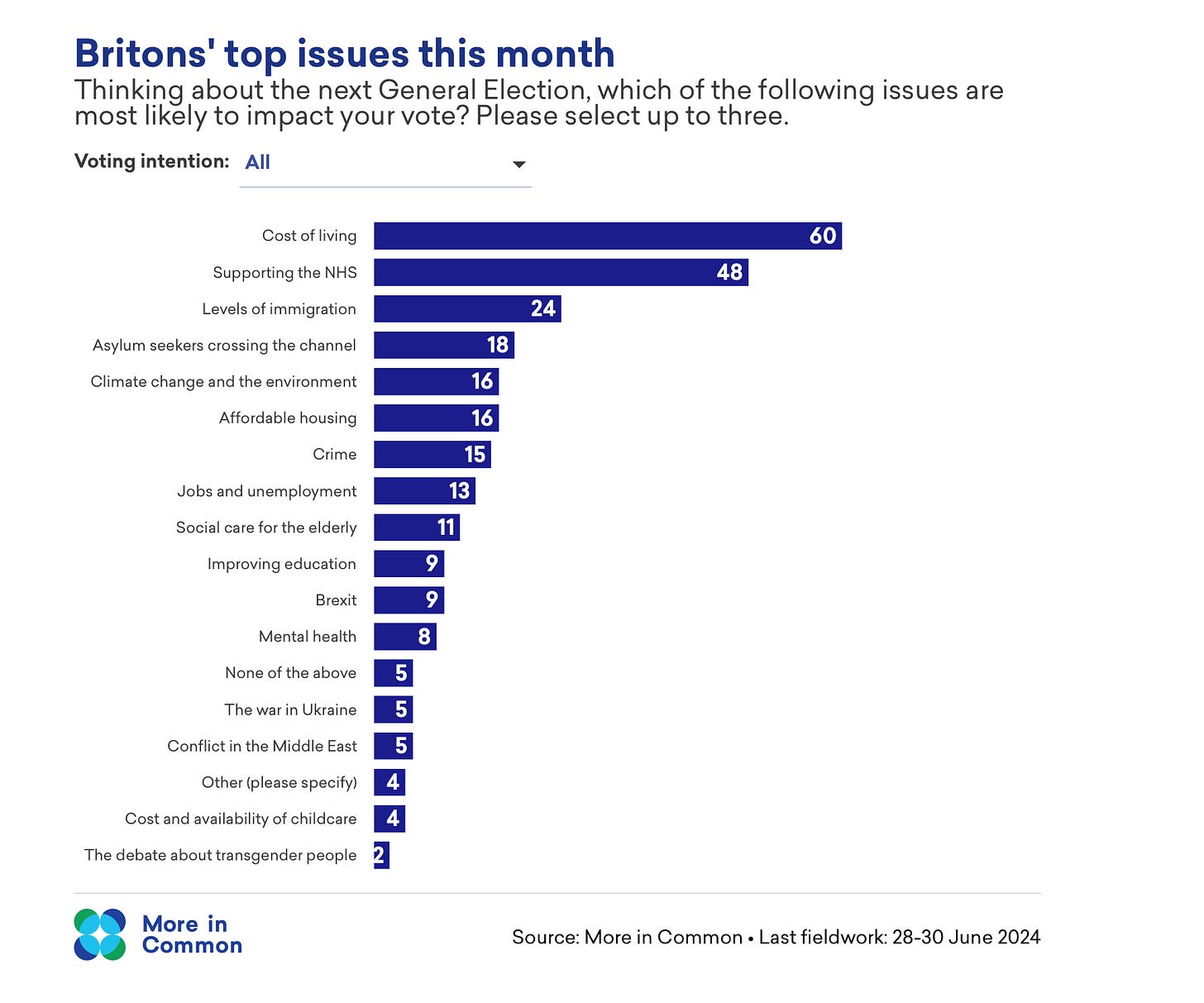How Transphobia ‘Crowded Out’ Real Feminist Issues in the UK Election
Research shows right-wing media coverage of gender-critical culture war activists like JK Rowling led to women’s and feminist election issues being ignored
Photo by Produtora Midtrack
A large part of so-called gender-critical (anti-trans) activism’s focus is on the false claim that trans women’s rights are harmful to cisgender women — the idea that trans women using bathrooms, changing rooms or other single-sex spaces will result in cis women being assaulted, either by predatory trans women or by cisgender men pretending to be trans women.
Trans women have always used the women’s bathroom — because we’re women — and there is no evidence that laws allowing us to do so increase violence against women. Research shows that there is no increase in violence against women in states that have trans-inclusive laws around single-sex spaces.
Conversely, separate research focusing on trans youth shows that when you force trans people to use single-sex spaces, they experience higher rates of sexual assault.
Those arguing that trans people should be banned from using single-sex spaces aligned with their gender identity are effectively pushing for a solution to a problem that doesn’t exist, one which would increase the incidence of sexual assault — against trans people.
The gender-critical obsession with single-sex spaces also harms cisgender women because it distracts from the real causes of sexual violence against women, cis or trans: cisgender men, or rather, the way cisgender men are socialised in a society that perpetuates rape culture and misogyny; a problem made worse by wholly inadequate criminal justice system responses to sexual violence.
It also distracts from wider discussion of other issues which impact women, like unequal pay, a lack of childcare, healthcare disparities, and so much more.
This is something transgender people and women’s rights groups have been saying for some time. New research conducted by media experts at Loughborough University, UK, highlights how the uneven focus on gender-critical ‘culture war’ rhetoric during the UK election led to real women’s issues being left out of mainstream political debate.
Stealing the limelight
Researchers at Loughborough University in the UK found that media output during the run-up to the election on July 5th was incredibly male-dominated: between 30 May and 3 July, only six out of twenty most featured individuals across TV and print media were women, leading researchers to dub it the “mansplaining” election.
Only 36% of news features were authored by female journalists, up from 28% in the 2019 general election but still far below equal representation.
Of course, it isn’t just a simple matter of more women speaking and being listened to, but also what they’re talking about.
When the researchers at Loughborough looked at the top ten people featured in media coverage during the week of 20–26 June, 3 were women: Labour MPs Rachel Reaves and Bridget Phillipson, and JK Rowling.
Tory leader Rishi Sunak, Labour leader Kier Starmer and Reform Party leader Nigel Farage took the top three spots, receiving 70% of total coverage. Reeves came fourth, receiving 5%, while JK Rowling (sixth) received 4.3% and Phillipson (ninth) received 3.4% of coverage.
For context, that same week Angela Rayner, the now Deputy Prime Minister (Shadow Deputy at the time) came seventeenth, with 1.2% of coverage.
Rowling was the only non-politician to make the top 20 throughout the election campaign.
According to researchers, Phillipson and Rowling weren’t featured for talking about real women’s issues, but because of their prominence in the ‘debate’ around trans people pushed by anti-trans, gender-critical activists.
What we’re seeing in this election is that women’s issues are being framed around the conflict around ‘gender ideology’. A potential interesting finding is how that focus might be crowding out other issues pertaining to women.
— Dr Jilly Kay, Loughborough University
Rowling was featured because of her criticism of Labour’s plans to reform the Gender Recognition Act, leading to Labour’s Shadow Chancellor, Rachel Reeves, offering to meet Rowling to give her “reassurances” — one reason Reeves made the top ten for coverage.
Philipson was featured because she supported transgender women’s right to use women’s single-sex spaces (a right we have had since 2010, without issue), which seemed to be at odds with Keir Starmer’s trans-exclusionary statements in the final weeks of the campaign.
Kemi Badenoch, the former Women and Equalities Minister under the Conservative government made it into the top twenty that same week. Researchers say this is because of her spat with actor David Tennant following his commentsabout her anti-trans policies, in which he said he wished she would “shut up”.
Tennant has a transgender child — a fact left out of most reporting on the issue.
This all suggests that women’s issues were ignored in favour of gender-critical transphobia (although they quite possibly might have been ignored anyway). The latter has, for the UK media, become synonymous with women’s rights following years of successful gender-critical campaigning and platforming by a trans-hostile media.
As transgender people and real women’s rights groups have been saying for some time, gender-critical activists don’t represent all women, and their hateful single-issue obsession with restricting the rights of trans people also hurts women.
It’s a harmful distraction, one the media and some mainstream politicians are all too willing to play along with, either for reads and clicks, or so they don’t have to talk about real issues.
Pushing a non-issue
Activists like Rowling often claim that transgender people’s use of single-sex spaces and our right to self-identification are huge issues for women, and voters in general.
However, this wasn’t born out in election results or polling of voter issues.
Research by the group More in Common found that only 2% of those polled thought the “debate about transgender people” was likely to impact their vote — the lowest for any of the possible options. This figure hasn’t changed since similar polling in 2022.
Source: More in Common
According to researchers at Loughborough, the category “minority groups” was seventh most prominent in media coverage during the election, receiving 5% of coverage overall, mostly comprising discussion of gender identity.
This is far more than topics that were shown to be important to voters according to opinion polling, such as “education” and “environment”, which only received 2% of coverage each, or “housing” and “social care”, which both only received 1%.
I did find one article about women (other than gender-critical activists) expressing concern over trans rights, from the Guardian.
The article gives no clear figures (it merely states “hundreds”), and seems to draw from its own comments section — which is crucial given the Guardian has been platforming gender-critical views for years. The article notes that some women also expressed concern for transgender relatives.
Overall, transgender rights don’t seem to be a major concern for voters, even women voters.
Transphobia: not a vote-winner
Anti-trans activist Posie Parker (aka Kelly-Jay Keen), who stood for election as leader of the Party of Women (POW), which ran on a single-issue anti-trans platform, received only 196 votes, coming last. The winner in the constituency Parker ran in, Bristol Central, was the Green Party’s pro-trans candidate Carla Denyer.
Other POW candidates performed abysmally in every seat they ran for, coming last or second last.
Even some mainstream MPs who have been vocally anti-trans lost their seat, including conservative politicians Miriam Cates and former Prime Minister Liz Truss, as well the Scottish National Party’s Joanna Cherry and Neal Hanvey of the Alba Party.
Sadly, transphobic Labour MP Rosie Duffield was spared her seat, though she wasn’t given the position of Women and Equalities Minister as some feared she might — that went jointly to Annaliese Dodds and Bridget Phillipson, both regarded as moderately pro-trans.
Even Labour’s Wes Streeting, the now Health Secretary who has been vocal about banning trans women from women’s hospital wards, almost lost his seat. There were only around 500 votes between him and British-Palestinian independent candidate Leanne Mohamed, though Labour’s support for Israel’s genocide in Gaza was likely a larger influence on the result.
One thing is clear: running on a platform of transphobia certainly wasn’t a vote-winner, even if it wasn’t necessarily a vote-loser either.
Right-wing culture war
When researchers looked at which media outlets were pushing the anti-trans debate during the election, they found it was mostly the right-wing print media: the Daily Telegraph, Daily Mail, Times and the Sun.
The Guardian was another unsurprising culprit; although generally considered centre-left, the newspaper has been central to platforming gender-critical activists in the UK.
So what does all this mean?
Transgender people and our rights aren’t a major concern for people in the UK, either in a positive or negative sense. You can make what you will of that, but I’m tentatively chalking it up as a plus.
The disproportionate media focus on transgender people is, therefore, largely the result of the right-wing press and transphobic, gender-critical activists and politicians trying to stoke a culture war by spreading fear and misinformation among the general public.
And it hasn’t really worked.
That’s not to dismiss the rise in anti-trans hate crimes and violent attacks, but it shows that, despite all the time and effort put into trying to turn the public against us, most people just don’t care. As always, those who want to hurt us or who oppose our rights based on misinformation are a minority.
That’s something at least.
Now all we need is for the new Labour government to understand that attacking transgender people isn’t going to win them any public support, and is thus a harmful waste of time.
They need to stop pandering to a certain transphobic, billionaire fantasy author, call out the right-wing media’s hate for what it is, and ditch the culture war.
Then maybe, just maybe, we might get to the important work of improving rights for women and transgender people — by addressing real issues, rather than non-issues pushed by a tiny, hateful minority.
Thanks for reading. If you enjoyed this article or found it useful and want to support my writing you can subscribe here to get an email every time I publish and you can tip me here.





